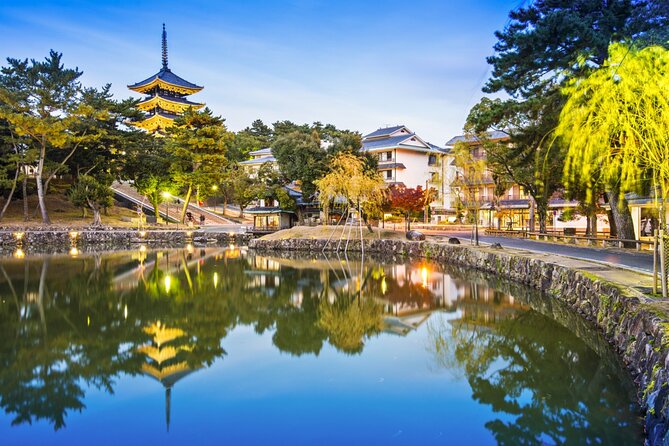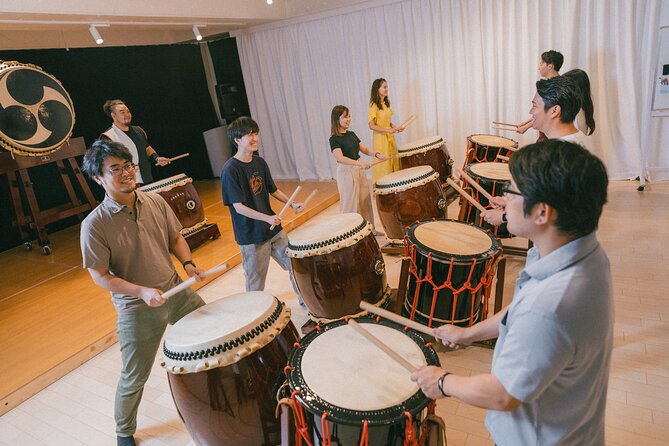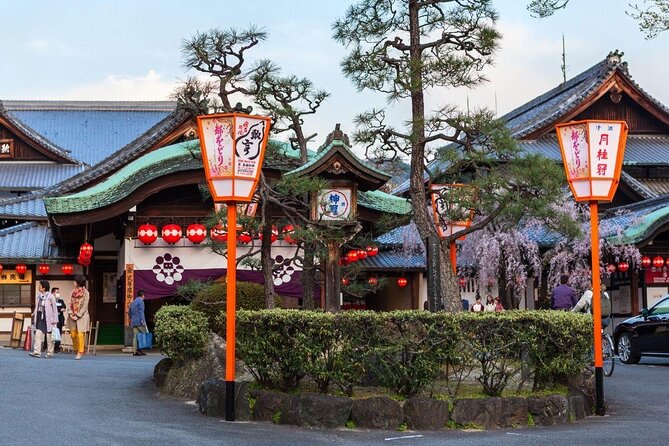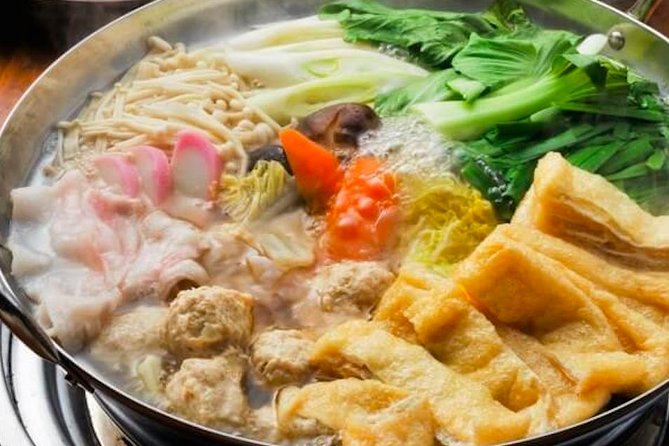Experience the elegance and tranquility of a traditional Japanese tea ceremony on Miyajima Island.
Enjoy the rich cultural heritage of this UNESCO World Heritage Site while donning a beautiful kimono.
Learn about the history and significance of tea in Japanese culture as you engage in the preparation and serving of matcha tea, guided by experienced tea masters.
With prices starting from $68.32, this accessible and authentic tea ceremony experience is not to be missed.
Book now to create lasting memories.
Quick Takeaways

- The tea ceremony and kimono dressing in Miyajima offer a deep exploration of Japanese culture and its traditional art forms.
- Tea holds great significance in Japanese culture, representing harmony, respect, mindfulness, and social connection.
- The serene atmosphere and matcha preparation in the tea room provide a meditative and mindful experience.
- Miyajima Island and Itsukushima Shrine offer breathtaking natural surroundings and a rich cultural heritage, making it a must-visit destination for an authentic tea ceremony experience.
Tea Ceremony: A Cultural Immersion
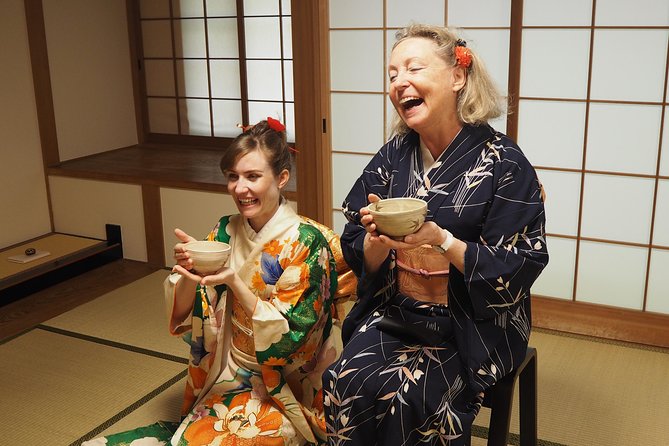
Immersing oneself in the tea ceremony experience while wearing a kimono in Miyajima allows visitors to engage in a deep exploration of Japanese culture.
The tea ceremony, known as ‘chanoyu’ or ‘sado,’ is a traditional art form that has been practiced for centuries. It’s a symbol of harmony, respect, and mindfulness.
During the ceremony, participants follow strict tea ceremony etiquette, which includes bowing, sitting in a specific manner, and using proper utensils. The ceremony isn’t just about drinking tea; it’s a holistic experience that encompasses all the senses.
Matcha, the powdered green tea used in the ceremony, has numerous health benefits. It’s rich in antioxidants, boosts metabolism, and promotes relaxation. By participating in a tea ceremony, visitors not only gain insight into Japanese customs but also enjoy the soothing effects of matcha tea.
Kimono Dressing: Traditional Attire
Participants in the authentic tea ceremony experience in Miyajima engage in the traditional art form while donning the elegant and symbolic attire of a kimono.
The kimono is a traditional fashion that holds deep cultural significance in Japan. It’s a beautiful garment made from high-quality silk, intricately designed with vibrant patterns and colors. The process of kimono dressing is a meticulous one, involving layers of clothing and the use of various accessories.
By wearing a kimono during the tea ceremony, participants not only embrace the traditional fashion but also show their appreciation for Japanese culture. The kimono represents grace, beauty, and respect, and wearing it adds an extra layer of authenticity and reverence to the tea ceremony experience.
It’s a way to truly take in the rich traditions of Japan and engage with its cultural heritage.
Tea’s History: Significance in Japan
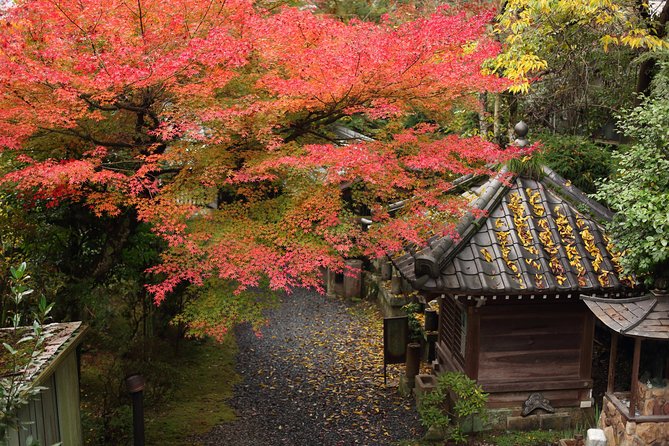
The historical significance of tea in Japan is deeply rooted in its culture and traditions. Here are four reasons why tea holds such importance in Japanese society:
- Tea’s health benefits: Tea is known for its numerous health benefits, including boosting the immune system, improving digestion, and promoting relaxation. The Japanese have long recognized the medicinal properties of tea and have incorporated it into their daily lives.
- Tea and spirituality: Tea has a spiritual aspect in Japan, with the tea ceremony being a form of meditation and a way to connect with nature and oneself. The preparation and serving of tea is considered a sacred ritual that requires mindfulness and attention to detail.
- Tea as a symbol of hospitality: The act of serving tea to guests is a sign of respect and hospitality in Japanese culture. It’s a way to welcome and honor visitors, creating a warm and inviting atmosphere.
- Tea as a social activity: Tea gatherings provide an opportunity for people to come together, engage in meaningful conversations, and build relationships. It’s a time to pause, reflect, and enjoy the company of others while sipping on a cup of tea.
The historical significance of tea in Japan goes beyond its taste and aroma. It’s a symbol of wellness, spirituality, hospitality, and social connection. By participating in a tea ceremony while wearing a kimono in Miyajima, visitors can experience firsthand the rich cultural heritage and traditions associated with tea in Japan.
Serene Atmosphere: Embracing Tranquility
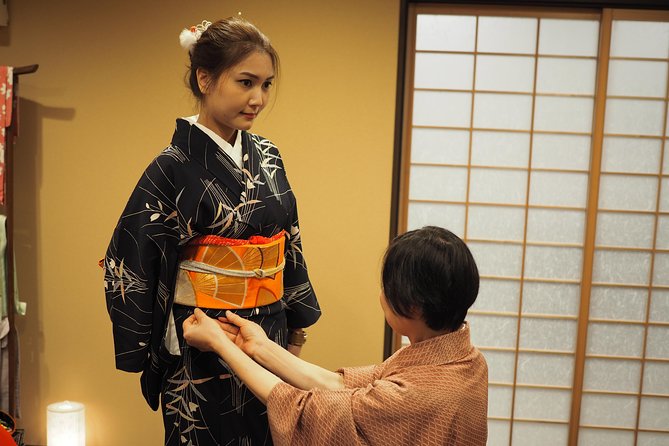
As visitors step into the tea room, they’re transported to a world of tranquility and peace. The serene atmosphere envelops them, creating a sense of calm and relaxation.
The tea room is meticulously designed, with elements like Zen gardens and traditional Japanese architecture contributing to its peaceful ambiance. Participants in the tea ceremony are encouraged to embrace mindfulness practices, allowing them to fully enjoy the present moment and appreciate the beauty of their surroundings.
The act of preparing and serving matcha tea becomes a meditative experience, as each movement is performed with intention and grace. The combination of the serene atmosphere, the mindfulness practices, and the aromatic tea creates a truly transformative experience for those who partake in the tea ceremony.
Matcha Preparation: Learn the Art
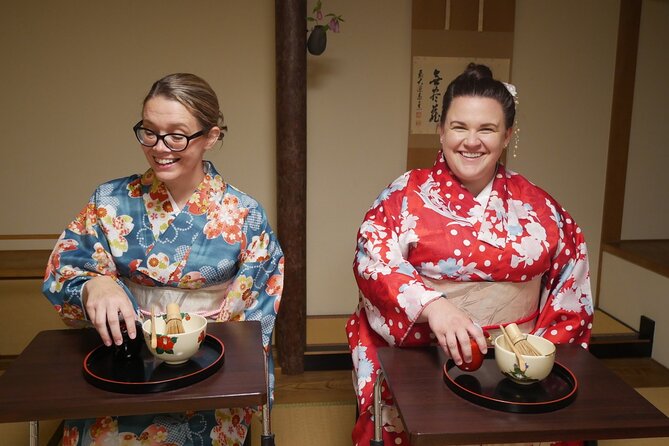
Embracing the serene atmosphere of the tea room, visitors have the opportunity to learn the art of matcha preparation during the authentic tea ceremony experience in Miyajima. Here are four aspects that make this experience truly special:
- Tea Ceremony Utensils: Participants will be introduced to the various tea ceremony utensils, each with its own symbolic meaning and significance. From the delicate tea whisk (chasen) used to froth the matcha to the traditional tea bowl (chawan) that holds the vibrant green tea, every utensil plays a role in creating a harmonious and aesthetic experience.
- Tea Ceremony Etiquette: Guests will learn the proper way to conduct themselves during the tea ceremony, following the traditional etiquette. From the respectful bowing to the precise hand movements when handling the utensils, every action is performed with grace and mindfulness, ensuring a respectful and authentic experience.
- Hands-on Experience: Participants will have the opportunity to actively participate in the matcha preparation process, from sifting the powdered tea to whisking it into a frothy consistency. This hands-on experience allows for a deeper understanding and appreciation of the meticulous process behind the art of matcha preparation.
- Cultural Significance: The tea ceremony holds great cultural significance in Japan, representing harmony, respect, and tranquility. By learning the art of matcha preparation, visitors not only gain a new skill but also gain insights into Japanese culture and traditions. It’s a chance to connect with the rich heritage and experience a slice of Japan’s history firsthand.
Miyajima Island: UNESCO World Heritage
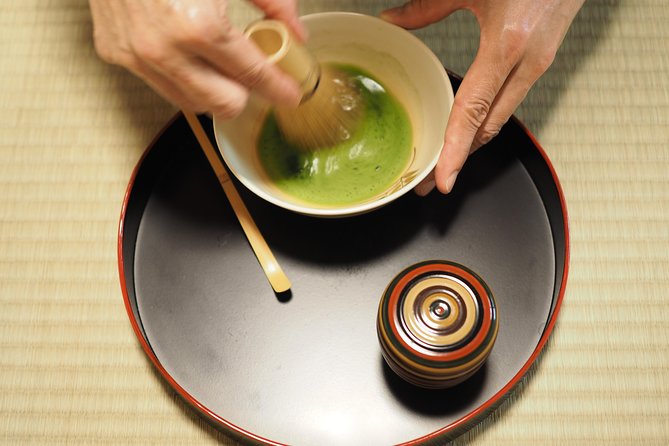
Miyajima Island, a UNESCO World Heritage site, boasts breathtaking natural surroundings and a rich cultural heritage. The island’s UNESCO recognition is largely due to the prominence of the Itsukushima Shrine, one of Japan’s most iconic landmarks.
This shrine is famous for its floating torii gate, which appears to be floating on the water during high tide. The shrine itself is built on stilts and offers stunning views of the surrounding mountains and sea. Visitors to Miyajima Island can explore the shrine grounds and experience the historical and cultural significance of this sacred place.
The combination of the island’s natural beauty and historical landmarks make it a must-visit destination for travelers seeking a unique and enriching experience.
Booking and Details: Pricing and Availability
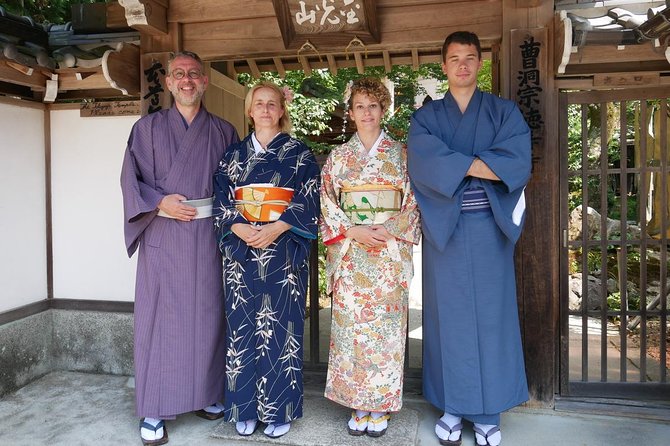
Visitors can easily find pricing and availability details for the authentic tea ceremony experience in Miyajima. Here are some key points to consider:
- Affordable options: The price for the tea ceremony experience starts from just $68.32. This makes it accessible to a wide range of budgets, ensuring that everyone can participate and enjoy this unique cultural activity.
- Group bookings: If you’re planning to visit Miyajima with a group, there are discounts available for group bookings. This allows you and your friends or family to have a memorable tea ceremony experience together while saving some money.
- Limited spots available: It’s important to note that spots for the tea ceremony experience are limited. To secure your place, it’s highly recommended to make an advanced booking. This way, you won’t miss out on this incredible opportunity.
- Flexible cancellation policy: In case your plans change, the tea ceremony experience offers a flexible cancellation policy. Make sure to check the details to understand the terms and conditions, but rest assured that if something unexpected happens, you won’t lose out.
Frequently Asked Questions
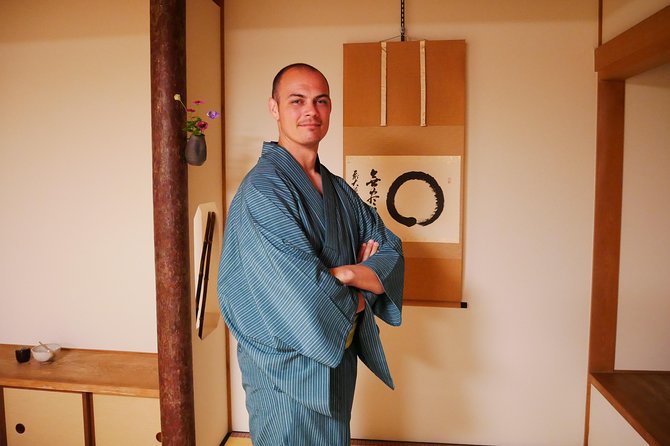
How Long Does the Tea Ceremony Experience Typically Last?
The tea ceremony experience typically lasts about 45 minutes to an hour. During this time, guests are immersed in the traditional tea ceremony, learning about its history and significance while enjoying a peaceful and serene atmosphere.
Can I Take Photos During the Tea Ceremony?
Yes, participants are typically allowed to take photos during the tea ceremony. However, it is important to adhere to photography etiquette and be respectful of the serene atmosphere. Please consult the guide for specific guidelines regarding traditional tea ceremony attire.
Are There Any Age Restrictions for Participating in the Tea Ceremony?
There are no age restrictions for participating in the tea ceremony. It is a cultural experience that can be enjoyed by people of all ages, allowing them to appreciate the significance of tea in Japanese culture.
Is Transportation to Miyajima Island Included in the Booking?
Transportation options to Miyajima Island are not included in the booking. Visitors can reach the island by ferry from Hiroshima. The best time to visit is during the cherry blossom season for a picturesque experience.
Is There a Minimum Number of Participants Required for the Tea Ceremony?
The tea ceremony experience does not have a minimum number of participants. The duration of the tea ceremony is typically around one hour, allowing individuals or small groups to enjoy this authentic cultural experience.
Recap
Enjoy the beauty and tranquility of a traditional Japanese tea ceremony while adorned in a stunning kimono on Miyajima Island.
Discover the rich history and significance of tea in Japanese culture as you prepare and serve matcha tea under the guidance of expert tea masters.
With limited spots available, be sure to book in advance to secure your place on this unforgettable journey of culture.
Trust Viator to provide you with an exceptional and authentic tea ceremony experience that will leave a lasting impression.


